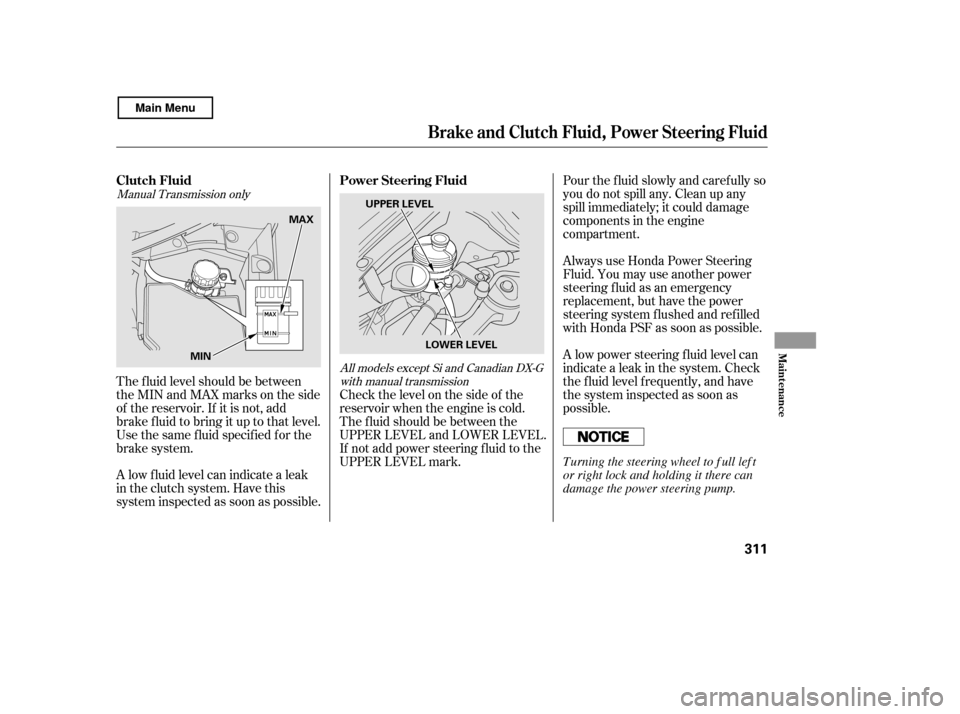Page 284 of 400

The anti-lock brake system (ABS)
helpspreventthewheelsfrom
locking up, and helps you retain
steering control by pumping the
brakes rapidly, much f aster than a
person can do it.You will f eel a pulsation in the brake
pedal when the ABS activates, and
you may hear some noise. This is
normal: it is the ABS rapidly
pumpingthebrakes.Ondry
pavement, you will need to press on
thebrakepedalveryhardbeforethe
ABS activates. However, you may
feel the ABS activate immediately if
you are trying to stop on snow or ice.If this indicator comes on, the anti-
lock f unction of the braking system
has shut down. The brakes still work
like a conventional system, but
without anti-lock. You should have
your dealer inspect your vehicle as
soon as possible.
If the indicator comes on while
driving, test the brakes as instructed
on page .
The electronic brake distribution
(EBD) system, which is part of the
ABS, also balances the f ront-to-rear
braking distribution according to
vehicle loading.
Let the ABS work f or you by always
keeping f irm, steady pressure on the
brake pedal. This is sometimes
ref erred to as ‘‘stomp and steer.’’
351
You should never pump the brake pedal.
Anti-lock Brakes (ABS)
ABS Indicator
280
Main Menu
Page 285 of 400

on loose or
uneven surf aces, such as gravel or
snow, than a vehicle without anti-
lock.
It only helps with the
steering control during braking.
such as trying to take a
corner too f ast or making a sudden
lane change. Always drive at a safe
speed f or the road and weather
conditions.
Always steer moderately
when you are braking hard. Severe
or sharp steering wheel movement
can still cause your vehicle to veer
into oncoming traffic or off the road.
If the ABS indicator and the brake
system indicator come on together,
and the parking brake is f ully
released, the EBD system may also
be shut down.
Test your brakes as instructed on
page . If the brakes f eel normal,
drive slowly and have your vehicle
repaired by your dealer as soon as
possible. Avoid sudden hard braking
which could cause the rear wheels to
lock up and possibly lead to a loss of
control.
351
Anti-lock Brakes (ABS)
A vehicle with A BS may require a
longer distance to stop
Important Saf ety Reminders
A BS does not reduce the time or
distance it takes to stop the
vehicle.
A BS will not prevent a skid that
results f rom changing direction
abruptly,
A BS cannot prevent a loss of
stability.
Driving
281
Main Menu
Page 309 of 400
If Honda antif reeze/coolant is not
available, you may use another
major-brand non-silicate coolant as a
temporaryreplacement.Makesureit
is a high-quality coolant
recommended f or aluminum engines.
Continued use of any non-Honda
coolant can result in corrosion,
causing the cooling system to
malf unction or f ail. Have the cooling
system f lushed and ref illed with
Honda antif reeze/coolant as soon as
possible.Make sure the engine and radiator
are cool.
Relieve any pressure in the cooling
system by turning the radiator cap
counterclockwise, without
pressing down.
If the reserve tank is completely
empty, you should also check the
coolant level in the radiator.
1. 2.
CONT INUED
Engine Coolant
Maint enance
305
RADIATOR CAP
DX, DX-G, LX, SE, EX, EX-L
Removing the radiator cap
while the engine is hot can
cause the coolant to spray out,
seriously scalding you.
Always let the engine and
radiator cool down before
removing the radiator cap.
Main Menu
Page 310 of 400
Pour coolant into the reserve tank.
Fill it to half way between the MAX
and MIN marks. Put the cap back
on the reserve tank.
Do not add any rust inhibitors or
other additives to your vehicle’s
cooling system. They may not be
compatible with the coolant or
engine components.
The coolant level should be up to
the base of the f iller neck. Add
coolant if it is low.
Pourthecoolantslowlyand
caref ully so you do not spill any.
Clean up any spill immediately; it
could damage components in the
engine compartment.
Put the radiator cap back on, and
tighten it fully.
Remove the radiator cap by
pushing down and turning
counterclockwise.
3.
4. 5.6.
Engine Coolant
306
Si
SiRESERVE TANK
RADIATOR CAP RESERVE TANK
DX, DX-G, LX, SE, EX, EX-L
Main Menu
Page 315 of 400

Manual Transmission onlyAll models except Si and Canadian DX-Gwith manual transmission
The f luid level should be between
theMINandMAXmarksontheside
of the reservoir. If it is not, add
brake f luid to bring it up to that level.
Use the same fluid specified for the
brake system.
A low f luid level can indicate a leak
in the clutch system. Have this
system inspected as soon as possible. A low power steering f luid level can
indicate a leak in the system. Check
the f luid level f requently, and have
the system inspected as soon as
possible.
Always use Honda Power Steering
Fluid. You may use another power
steering f luid as an emergency
replacement, but have the power
steering system f lushed and ref illed
with Honda PSF as soon as possible.
Pour the f luid slowly and caref ully so
you do not spill any. Clean up any
spill immediately; it could damage
components in the engine
compartment.
Check the level on the side of the
reservoir when the engine is cold.
The f luid should be between the
UPPER LEVEL and LOWER LEVEL.
If not add power steering f luid to the
UPPER LEVEL mark.
Brake and Clutch Fluid, Power Steering Fluid
Power Steering Fluid
Clutch Fluid
Maint enance
311
MAX
MIN UPPER LEVEL
LOWER LEVEL
T urning the steering wheel to f ull lef t
or right lock and holding it there can
damage the power steering pump.
Main Menu
Page 317 of 400
Push the electrical connector back
onto the bulb. Make sure it is on
all the way.
Turn on the headlights to test the
new bulb.
Insert the new bulb into the hole,
and turn it one-quarter turn
clockwise to lock it in place.
Remove the bulb by turning it
about one-quarter turn
counterclockwise.
Remove the electrical connector
f rom the bulb by pushing on the
tab to unlock it, then slide the
connector of f the bulb.
(Driver’s side)
Put the tube back in the clips and
install the reserve tank back in
place, making sure its bottom tab
is in the holder.
2. 3. 4. 5.6. 7.
CONT INUED
Lights
Maint enance
313
TAB
BULB
CONNECTOR
HOLDER
Main Menu
Page 318 of 400
To change the driver’s side bulb,
start the engine, turn the steering
wheel all the way to the right, and
turn of f the engine. To change the
passenger’s side bulb, turn the
steering wheel to the lef t. Remove the electrical connectorf rom the bulb by pushing on the
tab to unlock it, then slide the
connector of f the bulb.Remove the bulb f rom the
headlight assembly by turning it
one-quarter turn counterclockwise.
Insert the new bulb into the hole,
and turn it one-quarter turn
clockwise to lock it in place.
Push the electrical connector back
onto the bulb. Make sure it is on
all the way.
Turn on the headlights to test the
new bulb.
Use a Phillips-head screwdriver to
remove the screw from the inner
f ender, and pull the inner f ender
cover back. Reinstall the inner f ender cover.
Then reinstall the screw and
tighten it securely.
2.
1.
3.4. 5.6.7. 8.
Lights
L ow Beam Headlight
314
SCREW
BULB
ELECTRICAL CONNECTOR
Main Menu
Page 319 of 400
Remove the bulb f rom the socket
by pushing the bulb in and turning
it counterclockwise until it unlocks.
Install the new bulb in the socket.
Turn it clockwise to lock it in place.
Insert the socket back into the
headlight assembly. Turn it
clockwise to lock it in place.
Turn on the lights to make sure
the new bulb is working.
Remove the socket from the
headlight assembly by turning it
one-quarter turn counterclockwise.
To change the driver’s side bulb,
start the engine, turn the steering
wheel all the way to the right, and
turn of f the engine. To change the
passenger’s side bulb, turn the
steering wheel to the lef t.
Use a Phillips-head screwdriver to
remove the screw from the inner
f ender, and pull the inner f ender
cover back.
Reinstall the inner f ender cover.
Then reinstall the screw and
tighten it securely.
4. 5. 6. 7. 8.
3.
2.
1.
Lights
Replacing the Front Side Marker/
Parking/Turn Signal Light Bulb
Maint enance
315
Main Menu